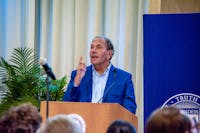Catholic cardinal calls for dialogue among religions
Speaking at the Faculty Club on Wednesday, Cardinal Walter Kasper lauded dialogue between religions in the United States, but added that xenophobia, terrorism and rising anti-Semitism present challenges for peacemakers. About 100 people attended the luncheon, including Boston Archbishop Cardinal Bernard Law and other religious leaders from the Boston area. Born in Germany, Kasper is the president of the Pontifical Commission for Religious Relations with the Jews. The Roman Catholic theologian spoke at Brandeis and Boston College as part his visit to the United States.
"We have a common heritage -- what Jewish people call the Bible, what we call the Old Testament -- and we have in common the Ten Commandments," Kasper said. "We have the same image of the human person -- that the human person is created in the image and likeness of God."
In recent decades, the late Pope Pius XII has faced criticism for allegedly failing to voice opposition to Hitler and the Nazi party. In addition, some have accused the Roman Catholic Church, under the leadership of the former pontiff, of exacerbating the genocide that occurred during the Holocaust. Others maintain, however, that under the former pope's leadership, often-discrete intervention by the Vatican saved some Jews from Nazi concentration camps.
"Christians and Jews should reflect on how (the Holocaust) could happen -- such an atrocity, unprecedented genocide," Kasper said. "This is a problem for both of us. We have to reflect on it."
"There cannot be peace in the world without peace among religions because religions touch the deepest dimension of the person," Kasper said.
Rabbi Barry Starr, the president of the Massachusetts Board of Rabbis and Dr. Diane Kessler, the executive director of the Massachusetts Council of Churches, spoke after the cardinal.
"We are blessed to have a community that listens, to have a Christian community that respects us and hears what we say and pays attention to our needs," Starr said. "I think we all understand, as a Jewish community, that this requires a response on our part."
Kessler said that other Christian denominations take notice of the Vatican's efforts to improve interfaith relations, particularly between Jews and Christians. "At the same time that we are in dialogue with our Jewish partners and with the Islamic community here, it also makes sense for Christians to confer with each other as we address these issues and to work cooperatively whenever possible," Kessler said.
Catholic Chaplain Father David Michael, who emceed the event, brought attention to the 37th anniversary of "Nostra Aetate," ("In Our Time"). This declaration by the Second Vatican Council was celebrated on Oct. 28. It also comments on the Church's relationship with other religious groups. Included in the document is a statement decrying anti-Semitism and calling for an improved dialogue between Jews and Catholics.
Kasper and Michael said this formal declaration by the Vatican was an essential statement against anti-Semitism.
The cardinal added that anti-Semitism is on the rise. "We thought anti-Semitism was overcome (for) all time," Kasper said. "This was a big mistake."
"It seems to me that Brandeis University, given its unique status as an institution sponsored by the Jewish community, has a prestigious voice to lend to this vibrant field of interreligious study and dialogue," Michael said. "In the Boston area, many Christians and Jews of all levels have been working tirelessly for decades to build a relationship of mutual trust, respect and cooperation, and some of the pioneers of that dialogue are here in this room."
"Friends, above all else, I believe, ought to understand what hurts the other," Starr said. "And, if we can come together to understand what hurts us -- for you to understand what hurts us as Jews and for us to understand what hurts you as Christians -- and in our dialogue groups we have begun to learn those lessons."
Kasper also praised the current pope, John Paul II, for fostering dialogue between Catholics and Jews. "I think he merits a place in the history of Jewish-Christian relations," Kasper said.
"With cooperation, dialogue is possible, but there are remaining different positions. Jews and Christians are not the same -- there are differences, and they will remain until the end of the world.



Please note All comments are eligible for publication in The Justice.